功能性语言
英语教学经验分享:在教学中如何兼顾语言的功能性和结构性
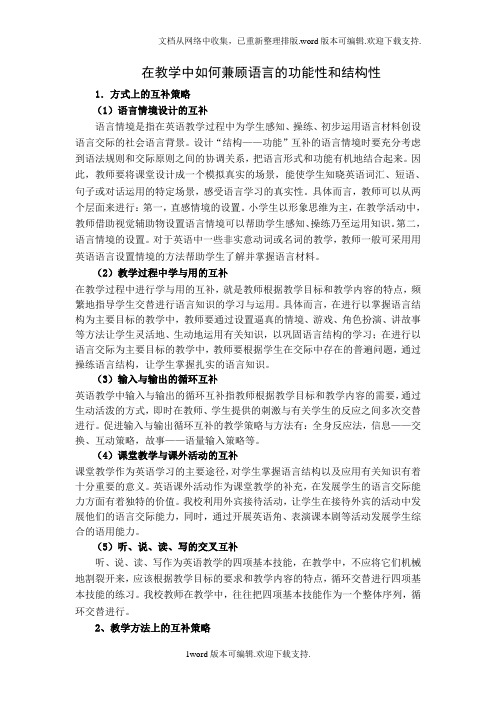
在教学中如何兼顾语言的功能性和结构性1.方式上的互补策略(1)语言情境设计的互补语言情境是指在英语教学过程中为学生感知、操练、初步运用语言材料创设语言交际的社会语言背景。
设计“结构——功能”互补的语言情境时要充分考虑到语法规则和交际原则之间的协调关系,把语言形式和功能有机地结合起来。
因此,教师要将课堂设计成一个模拟真实的场景,能使学生知晓英语词汇、短语、句子或对话运用的特定场景,感受语言学习的真实性。
具体而言,教师可以从两个层面来进行:第一,直感情境的设置。
小学生以形象思维为主,在教学活动中,教师借助视觉辅助物设置语言情境可以帮助学生感知、操练乃至运用知识。
第二,语言情境的设置。
对于英语中一些非实意动词或名词的教学,教师一般可采用用英语语言设置情境的方法帮助学生了解并掌握语言材料。
(2)教学过程中学与用的互补在教学过程中进行学与用的互补,就是教师根据教学目标和教学内容的特点,频繁地指导学生交替进行语言知识的学习与运用。
具体而言,在进行以掌握语言结构为主要目标的教学中,教师要通过设置逼真的情境、游戏、角色扮演、讲故事等方法让学生灵活地、生动地运用有关知识,以巩固语言结构的学习;在进行以语言交际为主要目标的教学中,教师要根据学生在交际中存在的普遍问题,通过操练语言结构,让学生掌握扎实的语言知识。
(3)输入与输出的循环互补英语教学中输入与输出的循环互补指教师根据教学目标和教学内容的需要,通过生动活泼的方式,即时在教师、学生提供的刺激与有关学生的反应之间多次交替进行。
促进输入与输出循环互补的教学策略与方法有:全身反应法,信息——交换、互动策略,故事——语量输入策略等。
(4)课堂教学与课外活动的互补课堂教学作为英语学习的主要途径,对学生掌握语言结构以及应用有关知识有着十分重要的意义。
英语课外活动作为课堂教学的补充,在发展学生的语言交际能力方面有着独特的价值。
我校利用外宾接待活动,让学生在接待外宾的活动中发展他们的语言交际能力,同时,通过开展英语角、表演课本剧等活动发展学生综合的语用能力。
论认知语言学与系统功能语言学对语篇连贯解释的互补性-功能语言

〇语言的功能维度编者按:功能是多维度研究语言的一个重要方面。
近年来,国内外语界,尤其是英语界,将太多精力集中在系统功能语言学的引进和诠释上。
本刊不否认这一功能语言学理论的重要价值,但是有价值的功能语言学理论还有很多,同样须要关注和研究。
就系统功能语言学而言,在引进的同时,须要从不同维度实现本土化和创新。
本期刊发周频先生关于认知语言学同系统功能语言学的互补性研究成果,不乏深刻和闪光之处;唐青叶博士从视角出发,探索语篇意义的建构,昭示我们:没有纯粹客观的意义,只有说话人从特定视角出发的主观建构意义。
提要:通过比较认知语言学(CL)和系统功能语言学(SFL)的哲学基础、基本假定、研究视角和研究方法,指出CL与SFL属于不同的语言研究范式,它们之间不存在包含关系。
由于它们具有共同研究的问题——语篇何以连贯,本文比较它们对该问题的研究进路,论证指出CL与SFL对于语篇连贯的解释在认识论和方法论上具有互补性。
关键词:认知语言学;系统功能语言学;语篇连贯;互补中图分类号:H0-05 文献标识码:A 文章编号:1000-0100(2009)03-0056-6Complementarity Between Cognitive Linguistics and Systemic Functional Linguisticson the Explanation ofthe Mechanism of Discursive CoherenceZhou Pin(Fudan University, Shanghai 200433, China; Wuhan University, Wuhan 430072, China)By comparing the philosophical basis, basic assumptions and research methods, this paper argues that cognitive linguistics and systemic functional linguistics cannot be in inclusion relation because they belong to distinct paradigms of linguistic studies. Rather, with the common research question — what makes discourses coherent, they are complementary in terms of epistemology and methodology.Key words:cognitive linguistics; systemic functional linguistics; discursive coherence; complementation认知语言学(CL)与系统功能语言学(SFL)之间究竟是包含关系还是互补关系,有不同的意见和争论。
功能语言学的语气系统
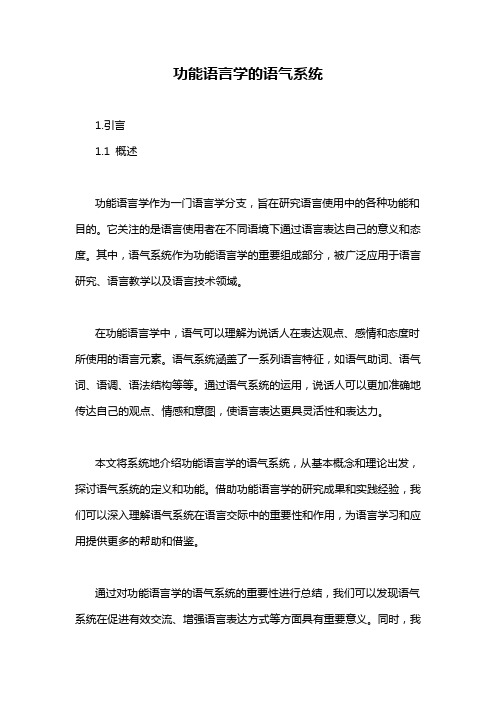
功能语言学的语气系统1.引言1.1 概述功能语言学作为一门语言学分支,旨在研究语言使用中的各种功能和目的。
它关注的是语言使用者在不同语境下通过语言表达自己的意义和态度。
其中,语气系统作为功能语言学的重要组成部分,被广泛应用于语言研究、语言教学以及语言技术领域。
在功能语言学中,语气可以理解为说话人在表达观点、感情和态度时所使用的语言元素。
语气系统涵盖了一系列语言特征,如语气助词、语气词、语调、语法结构等等。
通过语气系统的运用,说话人可以更加准确地传达自己的观点、情感和意图,使语言表达更具灵活性和表达力。
本文将系统地介绍功能语言学的语气系统,从基本概念和理论出发,探讨语气系统的定义和功能。
借助功能语言学的研究成果和实践经验,我们可以深入理解语气系统在语言交际中的重要性和作用,为语言学习和应用提供更多的帮助和借鉴。
通过对功能语言学的语气系统的重要性进行总结,我们可以发现语气系统在促进有效交流、增强语言表达方式等方面具有重要意义。
同时,我们还将展望功能语言学的语气系统的未来研究方向,以期进一步推动语言学的发展和应用。
通过深入研究语气系统,我们能够更好地理解和应用语言,提高语言交际的效果和质量。
总之,本文将为读者提供一个全面而系统的功能语言学的语气系统的介绍,帮助读者更好地理解语气系统在语言交际中的作用和价值,为语言学习者和语言研究者提供有益的参考和借鉴。
1.2文章结构文章结构:本文主要包括三个部分:引言、正文和结论。
在引言部分,首先对功能语言学的语气系统进行了简要的概述,说明了本文的研究对象和重要性。
接着,介绍了文章的结构,明确了各个部分的内容和顺序。
最后,明确了本文的目的,即对功能语言学的语气系统进行深入探讨。
正文部分分为两个小节:功能语言学的基本概念和理论以及语气系统的定义和功能。
首先,对功能语言学的基本概念进行了阐述,包括功能语言学的起源、主要理论基础和研究方法等。
接着,详细介绍了语气系统的定义和功能,包括语气的概念、语气的种类和语气在功能语言学中的作用等。
功能语言学简介

Back 韩礼德(Halliday,1925 ~) 青年时期在英国伦敦大学主修中国语言文学, 获得学士学位。1947年至1949年到中国北京大学 深造,导师为罗常培先生;1949年至1950为攻读 现代汉语转入岭南大学,跟随王力先生学习。回国 后,跟随剑桥大学弗思(Firth)教授继续攻读博士 学位;1955年完成了对用我国14世纪北方官话译 述的《元朝秘史》一文的语言学分析,获得剑桥大 学哲学博士学位。 韩礼德博采众家之长,同时形 成了自己的语言理论,远远超过自己的各位老师。 他的语言理论大致经历了两个阶段:价和范畴语法 (scale and category grammar)与系统功能语法 (systemic functional grammar)。 >>>more
6.法位学
7.认知语法
8.语言类型学
重研究那些形 美国功能主义 式主义无法解 开创于20世纪 释的现象。美 70年代,到80、 国功能主义的 90年代进入比 发展壮大了整 较成熟的阶段。 个功能语言学 早期的美国功 的力量。但美 能主义语言学 国没有公认的 在于揭示形式 领军人物,力量 主义语言理论 分散,整体上影 的不足,并注 响不如欧洲。 end The
介绍人:曾艳山
欧洲功能主义学派
功 能 主 义 语 言 学 的 流 派
美国功能主义学派
系统功能学派 推荐阅读书目
1.布拉格学派 欧 洲 功 能 主 义 学 派
2.伦敦学派
3.哥本哈根学派 4.法国学派
5.荷兰学派 6.俄罗斯学派
1.格语法
美 国 功 能 主 义 学 派
2.层次语法 3.Kuno的功能句法 4.语篇语法 5.角色与指称语法
>>>more
马丁内的功能语言学体系

马丁内的功能语言学体系马丁内的功能语言学体系,又称为马丁内主义,是由法国语言学家安德烈·马丁内于20世纪60年代提出的一种语言学理论。
该理论主张语言是一种具有功能目的的交际工具,语言的结构和形式是为了满足特定的交际需求而产生的。
本文将介绍马丁内的功能语言学体系的基本概念、核心观点和相关应用。
一、基本概念1. 交际功能:语言是人与人之间进行交际和沟通的工具,它具有表达信息、交流感受、实现目的等功能。
马丁内将语言的功能分为五个层次:表示、表达、交际、社会和文化功能。
2. 句子结构:马丁内通过对句子的结构进行分析,提出了“系统功能语法”(Systemic Functional Grammar)的概念。
他认为句子由主题、补充和陈述构成,每个成分都有特定的功能和语法关系。
3. 语篇结构:马丁内将语篇视为一种更高层次的交际单位,由多个句子组成。
他认为语篇具有主题、信息结构和篇章结构等方面的功能。
二、核心观点1. 功能优先:马丁内主张语言的结构和形式是为了实现特定的功能。
他认为语言的结构是为了表达信息、交流感受和实现目的等功能需求而存在的,因此功能应该是语言研究的核心。
2. 社会文化背景:马丁内认为语言是社会文化的产物,它受到社会和文化背景的影响。
他将语言与社会实践、权力关系、社会文化差异等方面进行了密切联系,强调语言与社会文化之间的互动关系。
3. 语言的多样性:马丁内坚持语言的多样性和变化性,他认为不同的语言具有不同的语法结构和功能特点,反对将某种语言视为标准或优越。
三、相关应用1. 教育教学:马丁内的功能语言学体系对教育教学领域有着重要的影响。
他提出的“功能语言教学”(Functional Language Teaching)方法强调以功能为导向,培养学生语言运用的能力和交际能力。
2. 语言分析:马丁内的功能语言学体系为语言分析提供了一种新的视角。
通过分析语言的功能和结构,可以更好地理解语言的运作方式和交际规律,为语言研究和应用提供理论支持。
coq的作用及功能主治
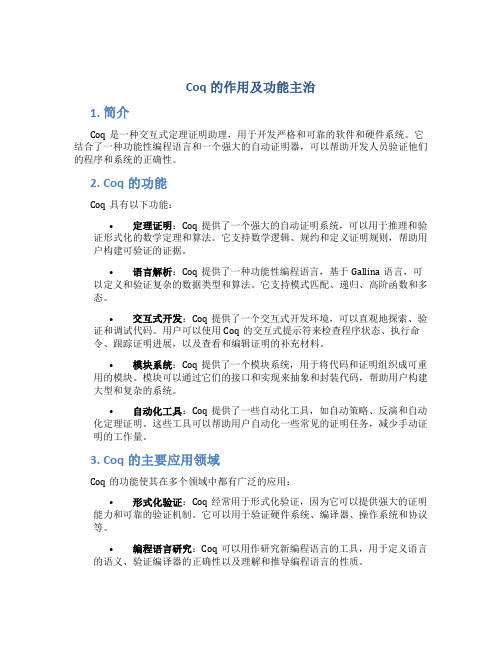
Coq的作用及功能主治1. 简介Coq是一种交互式定理证明助理,用于开发严格和可靠的软件和硬件系统。
它结合了一种功能性编程语言和一个强大的自动证明器,可以帮助开发人员验证他们的程序和系统的正确性。
2. Coq的功能Coq具有以下功能:•定理证明:Coq提供了一个强大的自动证明系统,可以用于推理和验证形式化的数学定理和算法。
它支持数学逻辑、规约和定义证明规则,帮助用户构建可验证的证据。
•语言解析:Coq提供了一种功能性编程语言,基于Gallina语言,可以定义和验证复杂的数据类型和算法。
它支持模式匹配、递归、高阶函数和多态。
•交互式开发:Coq提供了一个交互式开发环境,可以直观地探索、验证和调试代码。
用户可以使用Coq的交互式提示符来检查程序状态、执行命令、跟踪证明进展,以及查看和编辑证明的补充材料。
•模块系统:Coq提供了一个模块系统,用于将代码和证明组织成可重用的模块。
模块可以通过它们的接口和实现来抽象和封装代码,帮助用户构建大型和复杂的系统。
•自动化工具:Coq提供了一些自动化工具,如自动策略、反演和自动化定理证明。
这些工具可以帮助用户自动化一些常见的证明任务,减少手动证明的工作量。
3. Coq的主要应用领域Coq的功能使其在多个领域中都有广泛的应用:•形式化验证:Coq经常用于形式化验证,因为它可以提供强大的证明能力和可靠的验证机制。
它可以用于验证硬件系统、编译器、操作系统和协议等。
•编程语言研究:Coq可以用作研究新编程语言的工具,用于定义语言的语义、验证编译器的正确性以及理解和推导编程语言的性质。
•数学定理证明:Coq是一个强大的数学定理证明工具,可以用于形式化数学定理的证明,如四色定理、费马大定理等。
•系统安全:Coq可以用于形式化建模和验证系统的安全性。
它可以帮助开发人员检查程序中的潜在漏洞和安全隐患。
•密码学:Coq在密码学中的应用越来越多。
它可以用于证明密码协议的安全性和正确性,帮助设计更可靠的加密算法。
从功能语言学角度分析《致切斯特菲尔德伯爵书》的汉译
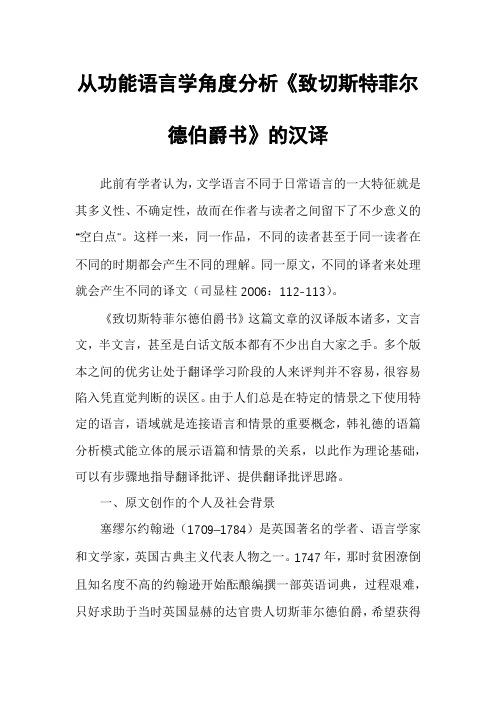
从功能语言学角度分析《致切斯特菲尔德伯爵书》的汉译此前有学者认为,文学语言不同于日常语言的一大特征就是其多义性、不确定性,故而在作者与读者之间留下了不少意义的“空白点”。
这样一来,同一作品,不同的读者甚至于同一读者在不同的时期都会产生不同的理解。
同一原文,不同的译者来处理就会产生不同的译文(司显柱2006:112-113)。
《致切斯特菲尔德伯爵书》这篇文章的汉译版本诸多,文言文,半文言,甚至是白话文版本都有不少出自大家之手。
多个版本之间的优劣让处于翻译学习阶段的人来评判并不容易,很容易陷入凭直觉判断的误区。
由于人们总是在特定的情景之下使用特定的语言,语域就是连接语言和情景的重要概念,韩礼德的语篇分析模式能立体的展示语篇和情景的关系,以此作为理论基础,可以有步骤地指导翻译批评、提供翻译批评思路。
一、原文创作的个人及社会背景塞缪尔约翰逊(1709–1784)是英国著名的学者、语言学家和文学家,英国古典主义代表人物之一。
1747年,那时贫困潦倒且知名度不高的约翰逊开始酝酿编撰一部英语词典,过程艰难,只好求助于当时英国显赫的达官贵人切斯菲尔德伯爵,希望获得他的支持与赞助,但却遭到拒绝。
约翰逊只好自力更生,历经7年苦楚,终于完成词典的编撰。
切斯菲尔德闻讯后抢先在当时流行的《世界报》上连续发表了两篇推崇约翰逊词典的文章。
此时,约翰逊口述了一封著名的书信,并亲自精心推敲修改后向切斯菲尔德发出,35年之后才公之于众。
信中明确指出切斯菲尔德的行为是在别人最不需要帮助时提出援助。
文章写于1755年的英国,正值英国古典主义文风盛行之时。
塞缪尔约翰逊也是英国期刊文学的代表作家之一。
期刊文学的语言在风趣幽默以及偶尔的讽刺中不乏典雅特质,并非纯粹的通俗语言。
因此,此类特色的英语篇章翻译成汉语需要仔细考量。
二、原文语篇分析从宏观角度来看,此文可以归纳为文学题材。
虽然是书信体,但是其话语范围属于文学性语言。
但仔细分析,一篇文章中可能兼有多个功能。
最新 备考新四级:四六级口试常用功能性语言-精品
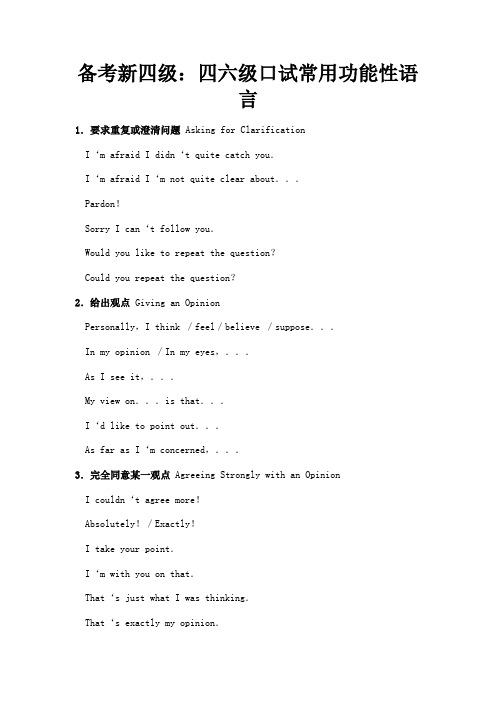
Could you repeat thn Opinion
Personally,I think/feel/believe/suppose...
In my opinion/In my eyes,...
Well,that depends.
I don‘t think so really.
I‘m afraid I can‘t agree.
I‘m afraid I‘m not convinced.
7.打断他人Interrupting
Excuse me,but...
Sorry for interrupting,but...
Well...
What I really want to say is that...
What I mean is that...
What I‘m getting at is that...
The point I‘m trying to make is that...
Let me put it another way.
Sorry to interrupt,but...
Can I come in here?
Can I interrupt for a moment?
I‘d like to add something here.
I have a point to make.
8.赢得时间Making Time and Repeating Your Statement
As I see it,...
My view on...is that...
I‘d like to point out...
- 1、下载文档前请自行甄别文档内容的完整性,平台不提供额外的编辑、内容补充、找答案等附加服务。
- 2、"仅部分预览"的文档,不可在线预览部分如存在完整性等问题,可反馈申请退款(可完整预览的文档不适用该条件!)。
- 3、如文档侵犯您的权益,请联系客服反馈,我们会尽快为您处理(人工客服工作时间:9:00-18:30)。
1. Talking About Personal Habits2. Expressing Likes and Dislikes3. Expressing Reasons for Likes and Dislikes4. Expressing a Preference5. Comparing6. Talking About Recent Changes7. Contrasting8. Suggesting9. Expressing Opinions10. Giving Reasons for Opinions11. Explaining12. Speculating ( = Guessing When You Don't Know)13. Speculating ( = guessing) About the Future14. Expressing Plans, Intentions and Hopes for the Future15. Clarifying16. Explaining a Word When you have Forgotten (or don't know) the Word17. Speaking in GeneralExample question:What do you usually do in the evenings?1.I usually ...2.I often ...3.While I'm studying I usually ...4.Sometimes I ....5.As a rule, I ...6.Whenever I can I ...**************************************************************************Example question:What kinds of music do you like?1.My favourite ... is ...2.I like ...3.I enjoy ...4.I'm (quite/rather) keen on ...5.I just love ...6.I absolutely adore ....7.I'm crazy about ...8.I'm addicted to ...9.I'm really into ...10.I don't mind ...11.As far as .... is concerned, I can take it or leave it.12.I don't care too much for ... = I'm not really into ...13.My least favourite .... is ...14.I dislike ...15.I can't stand ...16.I hate ... (extreme language)17.I find ...*************************************************************************1.... because ...2.... since ...3.The main reason I like...... is that it's ......4.What I like best about ..... is .....5.The thing I like best about ..... is ......6.The best/worst thing about ... is ...7.I don't like that very much because it's too ......8.That's because I find it ......*************************************************************************Example question:Do you (or, would you) prefer to travel alone or with others? (e.g., a friend)1.I prefer ... because2.My preference is ... because ...3.I prefer A to B because ...4.If I had the choice, I'd + V ... because ... (假设的话)5.If I had the choice, I'd rather + V... because ... (假设的话)6.If I have the choice, I'll + V .... (a real possibility for the future)*************************************************************************Example question:What are the differences between modern art in China and traditional Chinese art?1. A is bigger than B.2. B is not as big as A.You can also use some of these:∙Use “much” as in, “A is much better / worse than B”.∙“A is not nearly as good as B.”∙“B is nowhere near as big as A”∙“A is not quite as important as B.”∙“A is almost as important as B, but not quite.”∙“In comparison to B,A is quite big.”Or, “A is quite big in comparison to B”.∙“Compared to B, A is a lot bigger.”*************************************************************************Example question:Has your hometown changed much in the past few years? (e.g. 20 years)Yes, it has. For example, ...1.Today there are many more cars on the roads than there were thirty years ago.( ... there are/is more_____ than there were/was ....)2.The air pollution is much worse/much better than it used to be.( ______ is more ____ than it used to be.)pared to thirty years ago, the population of the city has increased by about twomillion.(Compared to thirty years ago, _______ has + 过去分词)4.The population of the city has increased by about two million people in the last thirtyyears.(______ has + 过去分词in the last thirty years)5.More people today own a car than was the case thirty years ago.(More _________ today + present tense than was the case thirty years ago.)6.Today, more and more people are living in high-rise apartment buildings whereas thirtyyears ago, we had very few high-rise apartments buildings in our city.(Today ______ are + 现在分词whereas thirty years ago + past tense)7.More and more large-scale supermarkets are being built nowadays but there were veryfew of them in my hometown thirty years ago(More and more ________ are being + 过去分词nowadays but + past tense thirty years ago.)*************************************************************************The question is usually 'a compare question'. When you answer one of these questions, you can use a contrasting statement. However, since the grammar of the comparing answers (see above) is more difficult, you will impress the examiner more by mostly using that, rather than by using contrasting statements.Example: "A is big but B is small."(____ is _____ but _____ is ____)∙ A contrasting statement has two parts and the second part basically repeats the first part in grammatical form but the idea expressed in the second part is the opposite idea to the first part.In the example above, the two ideas expressed are the adjectives 'big' and 'small' but you can use adverbs or phrases as well. (The yellow words are given extra stress because they are words in contrast.) For example, "He works quite slowly whereas I work quite fast" or, "I was on myway to work but he was on his way home."∙Of course, it's much better to add words such as 'quite'. For example, "A is quite big while B is rather small."∙Instead of 'but' you can use, 'while' or 'whereas'. It's possible but not necessary to include the expression, "on the other hand". For example, "A is quite big but, on the other hand, B israther small."∙The verb form doesn't have to be present tense – any suitable verb form is possible.∙When you speak a sentence with a contrasting statement, it is important to stress the words that are in contrast. (The examiners are looking for these stressed words. Examiners use contraststatements as part of their assessment of your pronunciation score, not so much your grammarscore.) For example: "A is quite big while B is rather small." The words 'big' and 'small' have the greatest sentence stress but 'A' and 'B' are also stressed.Example questions:What would you suggest a visitor to your country see and do?What do you think the government could/shoulddo?1.I'd .... (suggest, recommend, say, tell him/her/them) ....2.Maybe/perhaps/possibly ... + could / should ...3.It might/may help if ....+ past tense form of verb4.It would probably + (be a good idea, be useful, help) if + past tense formof verb5.I .... (suggest, recommend, say) ....************************************************************** ************9.Example question:Do you think that children should always be offered an incentive (a reward of some kind) when parents ask their children to do something?1.I think ...2.I believe ...3.I feel ...4.Personally, I (think, believe, feel) ...5.I tend to + (think, feel, believe) that ...6.In my opinion, ...7.In my view, ...8.I've always + (thought/believed/felt) that ...9.I maintain that ...10.I've always maintained that ...11.It seems to me that ...12.I'm convinced that ...13.As far as I'm concerned, ...14.My view is that ...15.From my point of view, ...16.To my mind, ...17.The way I see it, ...18.As I see it, ...∙Don't say, "personally in my opinion".∙Don't say, "In my eyes". Use, "In my view", instead.********************************************************************* *****10.1.... because ...2.... since ...3.The main reason I say that is because ...4.One of the reasons I say that is because ... (One reason I say that isbecause ... )∙Don't use, 'as' or, 'for' to mean 因为when speaking; they are too formal-sounding and unnatural when speaking.******************************************************************** ******11.Example question: Why are many older people reluctant to learn computer skills?1.The reason why ... is because / is that ...2.The main reason why ... is because / is that ...3.One reason why ... is because / is that ...4.One possible explanation (for that) is ...5.To understand why ....., you first need to ..... (understand, know, be awarethat)6.Well, it's like this: ....7.You could look at it this way: ...******************************************************************** ******(When talking about the present or the past)Example question: Do old people in China have opportunities to attend any forms of1.Well, I'm not sure but ...2.Well, I've never thought about that before but ...3.I imagine ...4.I guess ...5.I suppose ...6.I'd say ...∙ Since you're not sure, you can also use words such as, "maybe", "perhaps", "possibly", "probably", "it's quite likely that ...", "it's quite possible that ...","it's quite probable that ...", "may +V", "might +V", "could + V". (V = 动词原形)******************************************************************** ******13.(Most commonly, how the future will change, compared to now.)How do you think the tourist industry (in China) will develop in1.I predict ... + a noun2.I (can) foresee ... + [a noun + 现在分词] or + a noun3.I imagine / suppose / guess ...4.... will + adverb (or, adverb + will)5.... be (present tense) likely to ...6.... be (present tense) bound to ...7.... be (present tense) + going to + V (原形动词) = "will" + V (原形动词)8.There’ll probably / possibly be ...9.We might see / have ...10.... will be + 现在分词 ...11. ... might be + 现在分词 ...12.I'd be surprised if + past tense/past continuous tense13.I'll be very surprised if + present tense/past continuous tense14.I expect ...∙…Adverb‟ = …adverb of certainty‟ = definitely / certainly / probably / possibly.********************************************************************* *****14.Example question: What are your future work plans? (after you graduate)1.I plan to ...2.My plan is to ...3.I plan on + Ving (动名词)4.I intend to ...5.I hope to ...6.I'm going to ...7.My ambition is to ...8.My immediate goal is to ...9.My ultimate (= final) goal is to ...10.Ultimately, ...11.Hopefully, ...12.Ideally, ...13.I expect to ...14.I’d like to ...= I want to ..15.As an alternative, I might ...16.If all goes well, I'll / I should ...17.If everything goes according to plan, I'll / I should ...18.My dream is to ...19.It's always been my hope/plan/ambition/dream to ...20.My heart is set on + Ving (动名词)******************************************************************** ******15.1.What I mean is ..2.My meaning is ....3.In other words,4.That is to say, ...5.Let me put that another way.6.To put that another way, ...7.What I'm trying to say is ..8.My point is that ...9.More specifically, ...10.Forexample, ...11.Forinstance, ...Using "That is to say, ..." is a little formal-sounding. It is best to only use that when speaking quite seriously about something in Part 3 (or when answering a Part 1 question that is a "Part 3-style" question).******************************************************************** ******16."I can't remember the word but .....1.it's a thing that ...2.it's a type of ...3.it's something you ...4.he's a person who ...5.it's something like ...6.it's similar to ...7.it's kind of like a ..."8.**************************************************************************17.1.On the whole, ..2.As a rule, ...3.In general,4.Generally, ...5.Generally speaking, ..6.For the most part, ...7.Typically,ually,。
